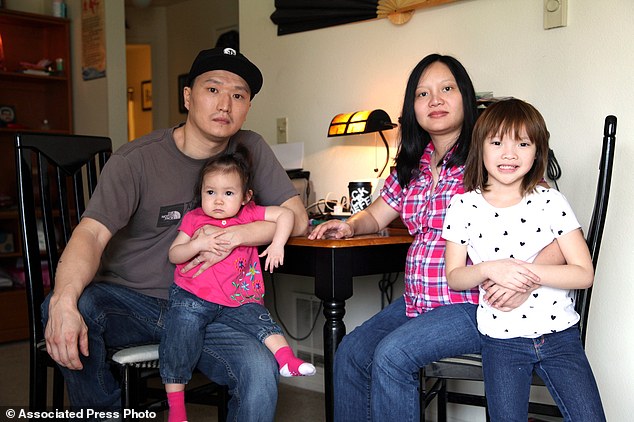
Last month, I shared with you Adam Crapser’s story. Adam was adopted at the age of 3 from Korea by two American families, both of whom subjected him to years of physical and psychological abuse. Now, Adam — who turned 40 last week — is senselessly facing deportation to Korea: a country on the other side of the world, that Adam does not know, and that is not his home.
Since Adam Crapser’s fight to stay in the only country he knows first appeared on this site, his story has taken off. Coincident with his first deportation hearing, Adam’s story was picked up by the Associated Press and has (finally) made it into major news outlets. Advocates for Adam partnered with 18MillionRising (@18MillionRising) to start a petition demanding that the deportation proceedings against Adam Crapser be dropped. Adam faces his second court appearance before an immigration judge — who will ultimately decide his fate — in June.
Many have characterized Adam Crapser’s struggle as an immigration reform issue. To the extent that changes to immigration law that grant automatic citizenship to all transnational adoptees would protect adoptees like Adam, this story does intersect with immigration law and the immigration reform lobby. However, in my mind, Adam Crapser’s story is less about immigration reform; to me, it is mostly about adoptee rights.
For me, the calculus is simple. Adam Crapser’s fate symbolizes how we — as a country — choose to treat our adoptee brothers and sisters. Do we choose to welcome adoptees fully as members of our personal, political, and national families? Or, do we choose to reinforce the disparaging narrative that even in their adopted countries and families, adoptees still don’t quite belong?
Hundreds of thousands of children that were adopted internationally currently reside in the United States; more than one-third of the world’s international adoptees were born in Asian countries such as China, South Korea and India. The international adoptees’ rights are not just an American issue, they are an Asian American issue.
I do not want to live in a world that treats adoptees at arms’ length, and that places political caveats around our political and cultural acceptance of adoptee Americans. Adoption should be an unconditional promise between foster parent and adoptee child: That this family will be your family. That this house will be your home.
Yet, so long as American laws would seek to deport adoptees adopted across international borders to countries culturally and linguistically foreign to them, this country violates the spirit of that promise. So long as American laws leave adult adoptees susceptible to life in undocumented status, unable to even an obtain a driver’s license, how can we ask adoptees to give us their love and trust? How can we promise adoptees that this country is their new home, when years later, we so easily renege on that promise?
This isn’t just about whether or not we let adult adoptees get deported (although they shouldn’t be). This is about whether or not we truly believe that adoptees have just as much of a right to call this country home as the rest of us.
In that context, the 2000 Child Citizenship Act — which granted automatic citizenship to international adoptees 18 years of age or younger — makes eminent sense: automatic naturalization for international adoptees is critical to substantiate the promise between foster parent and international adoptee child that this new home is truly their own, too. In that context, the Child Citizenship Act’s failure to address adoptees who were already adults by the year 2000 is a gross oversight.
Thankfully, activists like Kevin Vollmers of Gazillion Voices Radio and others have spent years seeking an amendment to the 2000 Child Citizenship Act that would extend its protection to adult international adoptees. Last week, various outlets reported that two Democratic senators — Jeff Merkeley (D-OR) and Amy Klobuchar (D-MN) — are authoring that amendment and plan to introduce it on the Senate floor sometime in the coming months. Vollmers told me that this proposed amendment has already gained support from a handful of other senators, including Democrats and a few Republicans.
However, if we want this planned amendment to serve as a crystal-clear message of inclusion for our adoptee brothers and sisters, we need it to gain far more traction in the Senate than it currently has. In particular, we need more — and stronger — bipartisan Senatorial support.
To that end, 18MillionRising announced today the launch of a brand new social media campaign and microsite: #KeepUsHome.
The site offers several ways to get involved not just to help Adam Crapser, but every adult international adoptee in America: You can sign a petition urging members of Congress — and specifically your individual representatives — to support Merkeley and Klobuchar’s proposed amendment to the 2000 Child Citizenship Act. You can donate funds to support the legal fight to protect the rights of America’s international adoptees. You can share your own story of adoption. Finally, you can also tweet your support to #KeepUsHome.
Now is the time to take action, for Adam and other adoptees without citizenship. Contact your lawmakers to encourage them to keep Adam home with his family and to finally fix the Child Citizenship Act of 2000. Tell them to #KeepUsHome: so Adam can receive the justice he deserves, adoptees who’ve been deported can come back to the US, and all international adoptees can hold in their hands what was promised to them as children: their citizenship.
